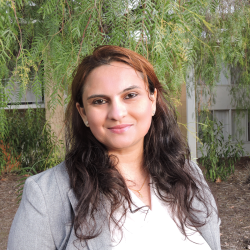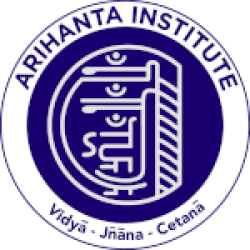
Intellectual Culture of the Jains: Encounters
Mar 10, 2025
9:00 - 10:30 AM PDT
Presiding: Steven M. Vose, University of Colorado-Denver

Steven M. Vose (PhD, South Asia Studies, University of Pennsylvania) is an Assistant Professor in the Department of History and holder of the Bhagwan Suparshvanatha Endowed Chair in Jain Studies at the University of Colorado-Denver. A historian of Jain communities in western India from the early Islamicate period to the present, his work focuses on community formation and interactions with political powers. His first book, Reimagining Jainism in Islamic India: Jain Intellectual Culture in the Delhi Sultanate (Routledge, forthcoming), is the recipient of the Edward C. Dimock, Jr. Book Prize in the Indian Humanities, awarded by the American Institute of Indian Studies (AIIS). His current research examines the effects of neoliberalism and globalization on transnational Jain communities.
Intellectual culture of the Jains: Encounters
Presenter: Jean Arzoumanov, University of Chicago

Dr. Jean Arzoumanov is the Ludo and Rosane Rocher Foundation postdoctoral fellow at the Department of South Asian Languages & Civilizations at the University of Chicago. As a historian of early modern and modern Persianate intellectual history in South Asia, Jean works on textual encounters between Islamicate and Indic cultures. In 2021, he obtained his PhD in South Asian Studies from the Université Sorbonne Nouvelle – Paris 3 with a dissertation on the representation of Indian sects and ascetics in Indo-Persian literature between the Mughal and colonial periods (16th-19th centuries). Building on this research for a forthcoming book, he studies the involvement of non-Muslim literati in Persian literary production, and more particularly in the development of Hindu devotional literature in Persian. In a forthcoming article with the Journal of Persianate Studies, he analyzes in depth the only known two Persian translations of Jain texts, dating from 1796. His other areas of interest include the history of astral sciences in early modern South Asia, and he has published several articles on the astronomical and astrological works of Mullā Farīd and Mullā Ṭayyib, two brothers active in the early 17th century.
“Jatī, Sīvra, and Srāvagī: A Survey of Persian Descriptions of Jain Monastic and Lay Communities”
Prior to the Mughal period, only two sources in Arabic and Persian appear to mention the Jains. With the development of Indo-Persian historiographical and ethnographical writings starting from the late 16th century, Jains become a recurring feature of the North-Indian religious landscape described by Muslim, Hindu, and Zoroastrian Persophone literati. Drawing their information from communities living in Gujarat and Rajasthan and noting the centrality of nonviolence for Jain monks – commonly referred to in Persian as "sīvra" and "jatī" – and laity, these accounts highlighted the distinctive practices derived from the imperative of protecting all forms of life. As in European sources, they focus on Śvetāmbara communities, and Digambara are often left out in Persian sources, while specific sectarian divisions are rarely mentioned. Accounts by Persophone Hindu authors also regularly disparaged Jain monks as repellent and grimy atheists, also reputed for their mastery of magic and astrology. This lecture will present some of these Persian sources and summarize their contrasted depictions of Jain communities.
Presenter: Venu Mehta, Assistant Professor, Claremont School of Theology

Venu Mehta, an Assistant Professor of Jainism & Comparative Spiritualities at the Claremont School of Theology, specializes in Jainism with a primary focus on Jain regional-vernacular devotional literature, narratives, and practices. Her PhD dissertation investigates the devotion to the Jain goddess Padmāvatī among the Śvetāmbar Mūrtipūjak Jains in Gujarat. Additionally, her work explores the Jain concepts such as forgiveness and non-attachment. Her recent research also delves into Jain-Hindu comparative theologies/spiritualities, particularly regarding goddess traditions. Mehta was a Fulbright Fellow (FLTA) at Indiana University, Bloomington in 2010-11. Mehta has authored essay on Anekāntavāda: The Jaina Epistemology in the volume, Constructing the Pluriverse: The Geopolitics of Knowledge, published by Duke University Press, and an essay on Jainism, Ecology and Ethics in Ecocultural Ethics: Critical Essays, published by Lexington Books. She has authored a book, Learn Gujarati, A Resource – Book for Global Gujaratis, Beginner’s Level published by Charotar University of Science and Technology: India. Mehta earned her first doctorate in Multicultural Education and Literature from Sardar Patel University, India.
“The Narratives of Devotion: Unveiling the Jain Goddess Padmāvatī in the Localized Jain History of Gujarat"
In this paper, I will be discussing specific narratives about the Jain goddess Padmāvatī, which were developed by the Śvetāmbar Mūrtipūjak Jains from the western state of Gujarat in India. These narratives can be found in medieval Sanskrit and Prakrit Jain literature such as Jinaprabhasūri’s Vividhatīrthakalpa and Dhaneśvarasūri’s Śatruñjaya-Māhātmya. I will show how these narratives have been further extended and circulated through the oral traditions of the Gujarati Jains, and how they have been adopted for interaction with the Goddess. My focus will be on the use of these narratives as a source of devotional material towards Padmāvatī. I will argue that in contemporary times, the Jains consider these narratives to be the construction of the Goddess within the localized history of the Jains.





